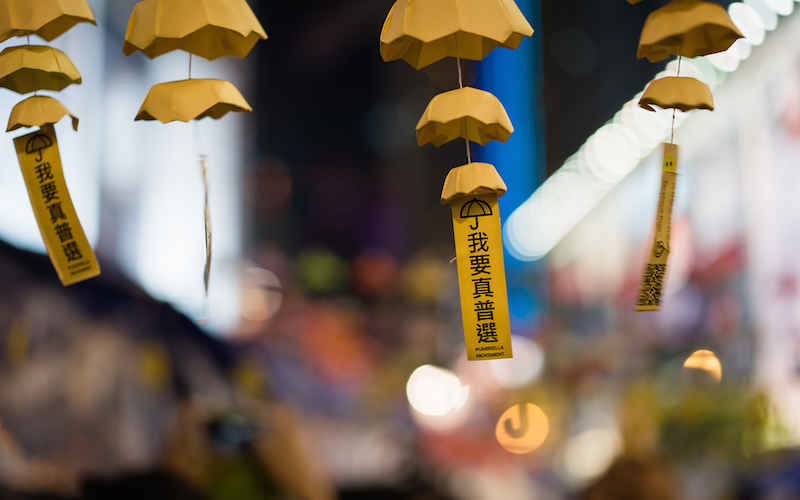
The Hong Kong Protests Must Remain Peaceful
In their Foreign Affairs article “Drop Your Weapons,” Erica Chenoweth and Maria J. Stephan investigate the “recent surge of nonviolent resistance movements” over the past three years. They found that “campaigns of nonviolent resistance against authoritarian regimes were twice as likely to succeed as violent movements” and chances that the resistance would lead to “peace and democratic rule” also improved through nonviolent resistance. Thus, the authors conclude, “civil resistance remains the best strategy for social and political change in the face of oppression.” This article holds an important lesson for Hong Kong’s protesters: the protests should remain peaceful so they are able to attain their desired reforms.
Hong Kong, a former British colony, was returned to China in 1997, where Beijing implemented the “one country, two systems” model in which the island was granted more freedoms than allowed in China proper. Hong Kong has grown to expect a certain degree of autonomy and potential for democratic governance. Recently, though, Hong Kong citizens have become “increasingly concerned with China’s long shadow.” They worry that Beijing will erode the one country, two systems model due to a recent decision by China’s leaders to determine which candidates will be allowed to participate in Hong Kong elections.
In response, protestors began gathering in opposition to this decision. Ultimately, protesters want free and fair elections and demanded the “semi-autonomous status China promised.” China has already stated that its government is strongly opposed to democracy in Hong Kong.
The crux of the protests, however, extends further than the upcoming election; it is also rooted in “the struggle for freedom and democracy in China” and how Beijing will respond to the demands of Hong Kong citizens. The statement from China regarding Hong Kong’s elections has been strong and protesters have voiced comparatively robust sentiments regarding their treatment from the Chinese government.
Protests have remained peaceful thus far and need to remain so to increase the possibility for future democracy. By not allowing violence to enter into the resistance, protesters prove their devotion to the cause for which they are gathering and procure more legitimacy. Nonviolent resistance exhibits a genuine commitment for democratic values such as human rights protection, individual freedoms, and cooperation among parties who hold disparate beliefs. The protests began months ago, with the protesters still determined to attract Beijing’s attention in hopes of reforms. However, the protesters are becoming polarized as some of the more radical have advocated that only more forceful maneuvers can “force concessions” on the Hong Kong and Chinese governments. In spite of how long the protests have lasted and in spite of how strong the reaction has been from Beijing and how divided the protesters become, Hong Kong protesters must ensure that the protests remain peaceful to obtain their ultimate objectives: creating a fully democratic system and retaining their autonomy in the one country, two systems model.
Despite any muscular responses from Beijing, the leaders of the occupy movement have made it clear that the protests must not escalate to violence, Beijing’s reaction has been a defensive posture, a fear of the movement spreading. Protesters have attracted Beijing’s attention enough for the Communist government to refuse to speak with the leaders and even limit their travel. Beijing’s reaction demonstrates that the protests have not gone unacknowledged and are now more about legacy and future possibilities. Thus, ensuring the protests remain non-violent could set a precedent for civil resistance in China and throughout the rest of the world.
This article was originally posted in Charged Affairs.

